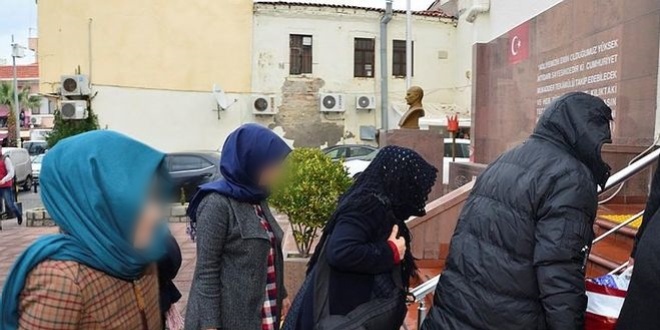Turkish police have detained 11 students and five homemakers in recent raids in Bursa and İstanbul over suspected links to the faith-based Gülen movement, the Kronos news website reported on Thursday.
The detainees are being held at the Bursa police station and are expected to appear in court on Friday.
President Recep Tayyip Erdoğan has been targeting followers of the Gülen movement, inspired by Muslim cleric Fethullah Gülen, since the corruption investigations of 2013, which implicated then-prime minister Erdoğan, his family members and his inner circle.
Dismissing the investigations as a Gülenist coup and conspiracy against his government, Erdoğan designated the movement as a terrorist organization and began to target its members. He intensified the crackdown on the movement following an abortive putsch that he accused Gülen of masterminding. Gülen and the movement strongly deny involvement in the coup attempt or any terrorist activity.
The detainees were reportedly subjected to a series of questions by the police about their subscriptions to Zaman, a newspaper shut down by the government in 2016 over its alleged affiliation with the Gülen movement. The interrogation also involved questions as to whether the detainees stayed in homes or dormitories linked to the movement. Finally, authorities questioned the detainees about their financial activities, specifically if they, their spouses or their children had accounts with Bank Asya.
Following the coup attempt the Turkish government accepted such activities as having an account at the now-closed Bank Asya, one of Turkey’s largest commercial banks at the time, and using the encrypted messaging application ByLock, which was available on Apple’s App Store and Google Play, subscribing to the Zaman daily or other publications affiliated with the members of the movement, as benchmarks for identifying and arresting alleged followers of the movement on charges of membership in a terrorist organization.
However, a decision by the European Court of Human Rights (ECtHR) in September 2023 in the case of Yüksel Yalçınkaya v. Turkey ruled that Turkey had violated three articles of the European Convention on Human Rights (ECHR) in the case of former teacher Yüksel Yalçınkaya. The court found violations of Article 6 (the right to a fair trial), Article 7 (no punishment without law) and Article 11 (freedom of assembly and association).
The Grand Chamber based its ruling on Yalçınkaya’s alleged use of the ByLock app, membership in a labor union and an association affiliated with the Gülen movement, and having an account at the now-closed Bank Asya. These were all considered signs of membership in the Gülen movement and criminal evidence by Turkish authorities.
Legal experts said the Grand Chamber’s decision clarified that the use of ByLock, depositing money at a Gülen-linked bank, or being a member of a Gülen-affiliated association cannot be considered criminal evidence against Gülen movement members.















